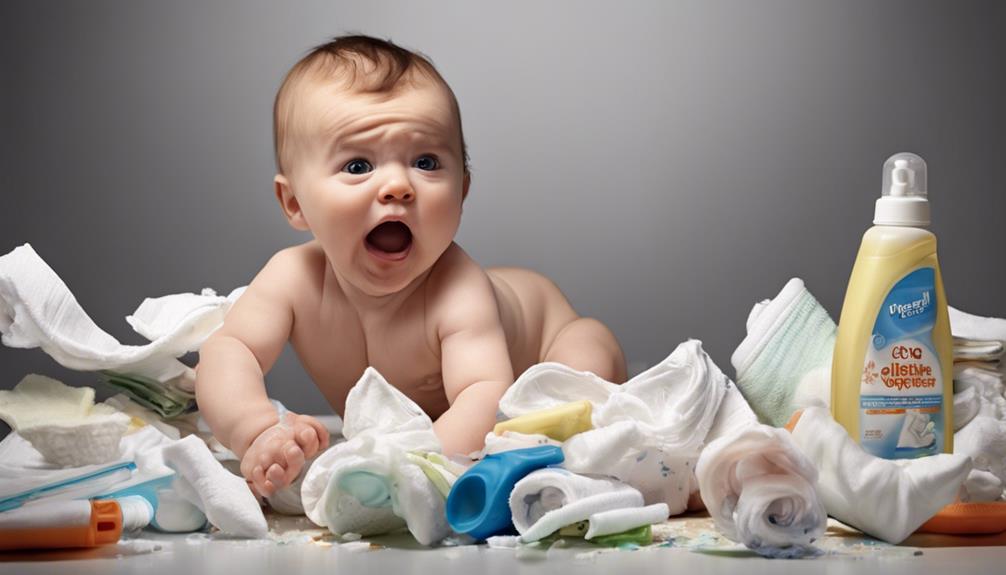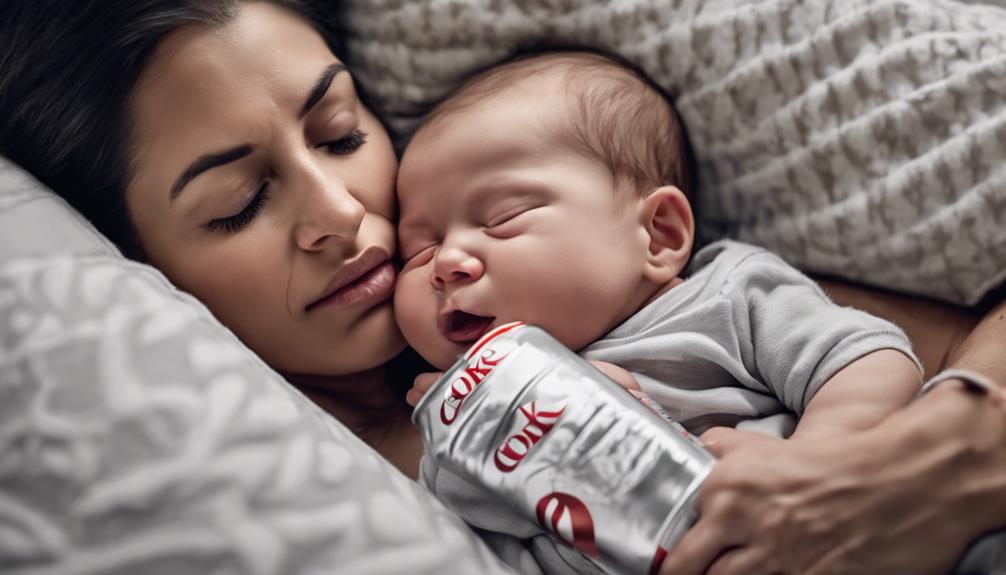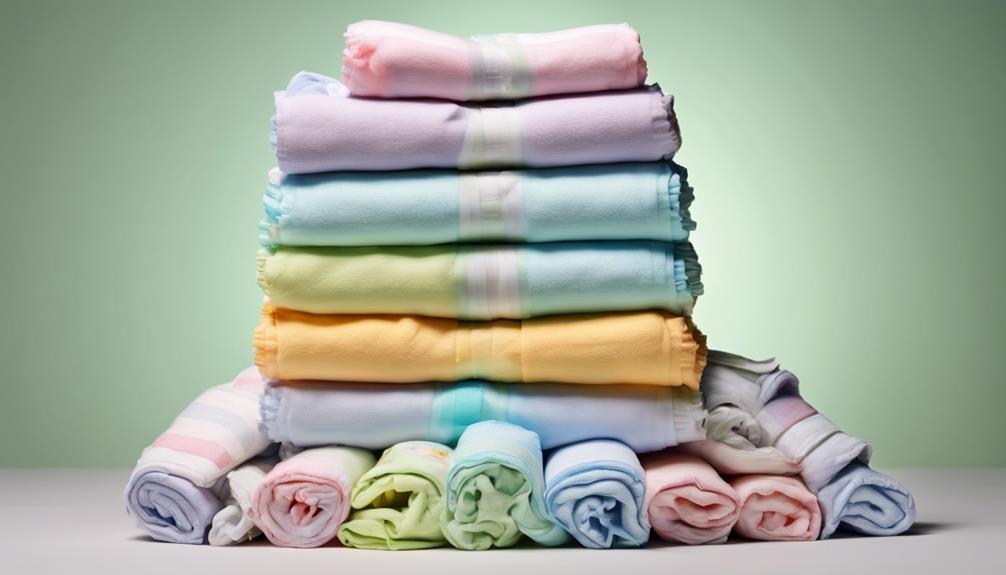As parents, we've all experienced the unexpected explosion that comes with a newborn's diaper change. However, understanding the science behind these messy situations is important in handling them with ease.
From diaper fit to dietary factors, various elements contribute to the explosive poop phenomenon. Let's unravel the mysteries behind these messy blowouts and discover practical tips for managing them effectively.
Key Takeaways
- Explosive newborn poop is common in 1-8 week olds.
- Proper diaper sizing and fit can prevent blowouts.
- Newborn poop characteristics vary between breastfed and formula-fed babies.
- Seek medical advice for unusual stool colors or persistent diarrhea.
Causes of Explosive Newborn Poop
Explosive newborn poop, characterized by sudden and forceful bowel movements, can be attributed to various factors in the infant's digestive system. In newborns between 1 and 8 weeks old, the likelihood of experiencing explosive poop is heightened due to frequent, watery stools. This can be concerning for both formula-fed and breastfed babies.
Formula-fed infants, in particular, are more prone to constipation, which can increase the risk of explosive poop incidents. Additionally, improper diaper sizing or fit can exacerbate the frequency of these messy situations. Understanding that explosive poop can occur irrespective of the baby's feeding method is important.
Infrequent bowel movements also play a role in the occurrence of explosive poop episodes. By recognizing these causes, caregivers can better manage and anticipate these messy but normal bodily functions in their newborns.
Understanding Bowel Movements in Newborns

Frequently, newborns exhibit distinctive bowel movements due to their underdeveloped digestive systems. Baby poop can vary depending on whether the newborn is breastfed or formula-fed. Breastfed newborns typically have mustard-yellow, seedy poop, while formula-fed newborns tend to have firmer, darker stools. These differences arise from the composition of breast milk versus formula and how they're digested by the infant's immature digestive system.
Newborns often have frequent bowel movements, sometimes after each feeding, as their digestive system is still developing. The color, consistency, and frequency of their poop can change as they mature. Explosive poop in newborns can occur due to various reasons such as gas buildup, rapid peristalsis, or a sudden release of stool.
Monitoring a newborn's bowel movements is essential as it can offer valuable insights into their health and digestive function. Understanding the nuances of baby poop is vital for parents to track their baby's well-being accurately.
Tips for Managing Diaper Blowouts
To effectively manage diaper blowouts, it's important to make sure the diaper is the correct size and snugly fitted to prevent leaks. Pulling out the ruffles on the leg cuffs can provide a better fit and enhance leak prevention.
Additionally, changing the diaper before starting on car trips can help avoid blowouts in the car seat. Always have a fresh diaper and a change of clothes readily available for quick cleanup after a diaper blowout.
Ensuring a snug fit is essential in preventing leaks and minimizing the mess caused by diaper blowouts. By taking these proactive measures, parents can be better prepared to handle unexpected situations and keep their little ones comfortable and clean.
Cleaning Up After a Diaper Explosion

After managing a diaper blowout, the focus shifts to thoroughly cleaning the baby's skin and disinfecting the surrounding area to maintain hygiene and prevent the spread of bacteria. Using baby wipes or a warm bath, gently clean the baby's skin to remove any remnants of poop. It's important to disinfect the changing area, changing pads, and affected clothing to make sure a clean environment for the baby. Promptly treat stained clothes with a stain remover before soaking and washing them to prevent the stains from setting in. Remember to address stained clothes before drying to effectively remove any traces of poop. Always have spare clothes available to quickly change the baby after a diaper explosion.
| Cleaning Steps | Details |
|---|---|
| Clean Baby's Skin | Use baby wipes or a warm bath to remove poop thoroughly. |
| Disinfect Surrounding Area | Wipe down changing area and items to prevent bacterial spread. |
| Treat Soiled Clothes | Apply stain remover and promptly wash to prevent stains. |
| Address Stains Before Drying | Make sure clothes are stain-free before drying to avoid setting. |
| Have Spare Clothes Ready | Always keep spare clothes handy for quick changes. |
Knowing When to Seek Medical Help
Seeking medical help is essential if your newborn exhibits 10 or more bowel movements a day.
If you notice bright red blood, mucousy, watery, or green stools, it may indicate a food intolerance like cows milk protein intolerance.
Diaper blowouts are common in the early months of a baby's life; however, if unusual symptoms accompany them, it's advisable to seek medical attention promptly.
Remember, while dealing with diaper blowouts can be overwhelming, they're typically a temporary phase in your baby's development.
It's important to pay attention to the frequency and consistency of your baby's stool to detect any signs of diarrhea in infants.
If you observe any concerning symptoms such as persistent diarrhea or unusual color changes in the stool, consulting with a healthcare provider is critical.
Early detection and intervention can help address any underlying issues and guarantee the well-being of your newborn.
Frequently Asked Questions
Is It Normal for Newborns to Have Explosive Poops?
Yes, it's normal for newborns to have explosive poops. Their immature digestive systems and frequent feedings lead to liquidy bowel movements. While messy, this is typically temporary and part of their development.
Why Does My Newborn Keep Having Blowouts?
We've noticed frequent diaper blowouts with our newborn. It's common among infants due to their watery stools and incorrect diaper fit. Formula-fed babies may experience more blowouts. Remember, it can happen with breastfed babies too.
Do Blowouts Mean the Diaper Is Too Small?
No, blowouts don't always mean the diaper is too small. Proper fit and securing are essential. Check snugness around waist, back, and legs. Adjust leg cuffs. Choosing the right size and fit can help prevent leaks.
Do Newborns Projectile Poop?
Oh, yes, newborns can definitely projectile poop! It's like a mini-explosion when it happens. Their tiny systems are just learning the ropes. So, get ready for some unexpected clean-up missions!
Conclusion
To sum up, dealing with a newborn's explosive poop may seem overwhelming, but understanding the causes and taking preventive measures can help manage the mess effectively.
By ensuring the diaper fits snugly, being prepared with a change of clothes, and staying attentive to your baby's bowel movements, parents can navigate through these messy situations with ease.
Remember, it's all part of the baby's development, and with proper care, you can handle it like a pro.










